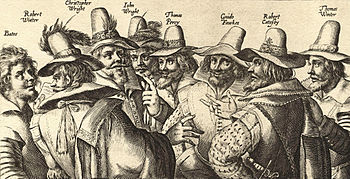Gunpowder Plot
 From RationalWiki - Reading time: 3 min
From RationalWiki - Reading time: 3 min
| How an Empire ends U.K. Politics |
| God Save the King? |
The Gunpowder Plot of 1605, was a failed assassination/revolution attempt by a group of provincial English Roman Catholics against King James I of England and VI of Scotland.
History[edit]
The plot intended to kill the king, his family, and most of the Protestant aristocracy in a single attack by blowing up the Houses of Parliament during the State Opening on 5 November. The conspirators had also planned to incite a popular revolt in the Midlands. However, a Member of Parliament whom the conspirators believed might be sympathetic to their cause tipped off the King. The conspirators were arrested and the attempted uprising was a failure.
Guy, or Guido, Fawkes is the most famous conspirator, since he was the man arrested in possession of the gunpowder, which was positioned in cellars under the Palace of Westminster. This has led to the myth that he was leader of the plot, although it was masterminded by Robert Catesby and Fawkes was a latecomer. Father Henry Garnet, head of the Jesuit Order within England, was also aware of the conspiracy (at least according to his trial) and was hanged for this. The conspirators, including Fawkes, were executed by hanging, drawing and quartering, a series of tortures and mutilations which was reserved for those convicted of high treason.[1]
Anniversary[edit]
The evening of the anniversary of the discovery and foiling of the plot, the 5th of November, is known as Guy Fawkes Night. It is traditional in the UK (especially in England) to burn effigies of Guy Fawkes on bonfires with accompanying firework displays. Prior to the burning of the effigy it used to be paraded with the plea "Penny for the Guy", to raise money for the fireworks but this does not happen so much today.
Until the twentieth century, this occasion was explicitly patriotic and anti-Catholic, a celebration of the Protestant monarchy's triumph over papist treachery.[2] Fortunately, as with Christmas, Easter and Mother's Day, it has become secularised, and is now regarded as an excuse for bonfires, fireworks and some quaint traditions.[3] Also as with many traditions associated with Christmas and Easter, the bonfire tradition derives from pagan times, when it was part of Samhain, the beginning-of-winter commemoration which is also the ancestor of Hallowe'en.[4]
A connected tradition is for the Yeoman of the Guard[note 1] to search the cellars of the Palace of Westminster before the State Opening of Parliament, just in case some wag has sneaked a few barrels of gunpowder in as a jape.[5]
The word guy in English is a classic case of semantic drift![]() . Originally meant as an insult towards someone, along the lines of asshole, thanks to American English it has become a standard way of referring to a person or group of people; this new American English definition is steadily displacing native words such as chap, much older loanwords such as fellow, and relatively newer loanwords such as bloke. Language can be quite strange in that way.
. Originally meant as an insult towards someone, along the lines of asshole, thanks to American English it has become a standard way of referring to a person or group of people; this new American English definition is steadily displacing native words such as chap, much older loanwords such as fellow, and relatively newer loanwords such as bloke. Language can be quite strange in that way.
Traditional Guy Fawkes Night poem[edit]
“”
Remember, remember the fifth of November, |
See also[edit]
Want to read this in another language?[edit]
Notes[edit]
- ↑ Not to be confused with the Yeoman Warders who guard the Tower of London. They get very testy if you make that mistake, as their (unofficial) website (apparently designed in 1992) makes very clear.
- ↑ A lantern having an opening with a shutter that can be slid across the opening to obscure the light. Not Kilowog from the DC comics universe.
- ↑ Up till the 19th or early 20th centuries, people could choke on cheese, especially if cheese vats were left open so foreign bodies could fall in.
- ↑ This is the original meaning of "faggot", a bundle, rather than the modern meaning from which it is derived, a homosexual.
References[edit]
- ↑ Bruce Robinson, "The Gunpowder Plot" on BBC History
- ↑ Marian T. Horvat, }is it anti-Catholic to celebrate Guy Fawkes Night?" on Tradition in Action
- ↑ Robert Booth, "Lewes bonfire society ends tradition of blacking-up ", 5 November 2017, The Guardian
- ↑ "Bonfire Night: Not so much about Guy Fawkes", 6 November 2016, WUHistory
- ↑ "State Opening: Elements unseen by the public" on Parliament.uk
 KSF
KSF
